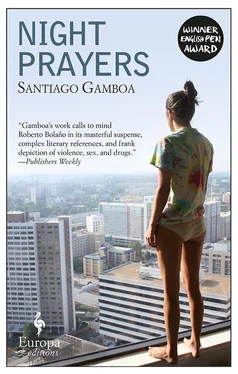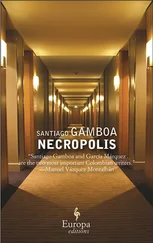It was horrible, going with Mother to buy clothes for the party. In every shop she’d complain about the prices, tell off the assistants, and ask for discounts, or ask if they didn’t have the same thing but cheaper. The assistants all looked at her with a mixture of mockery and commiseration. Until the day of the party came. I don’t know how to describe it to you, Consul. I spent the afternoon praying that seven o’clock would never come, that was the time the guests started to arrive, uncles and aunts and cousins of Mother’s, and a couple of colleagues from the bank, all with their gifts, ridiculous things, a plastic photo frame, an Avianca Airlines toiletry bag, two pairs of socks, a spectacle case, a box of handkerchiefs with strange initials, a tie with the word Carvajal at the bottom, things they must have been given for Christmas or birthdays and that they were getting rid of, until Víctor arrived with his father and gave me two gifts. The first was a pair of goalkeeper’s gloves and some kneepads, and the second was a box of books. Inside there was a note that said:
For the young reader of the neighborhood on his fifteenth birthday. A dozen novels. With pride,
P and C
Mother looked at it scornfully and said, how stupid of me, it was such a big box, I thought it was something good, and Father, who thanked the neighbors, looked and said, hmm, funny, they must be clearing shelves! but anyway, you don’t look a gift horse in the mouth, we can keep these for other birthdays, you always have to look on the bright side, isn’t that right, Manuelito? and I said, no, Dad, these books are mine, and he said, having already had a few drinks, all right, keep them if you want, son, but you’re not going to turn into one of those long-haired intellectuals, are you?
I still remember the titles.
Four of the twelve were a single novel, The Alexandria Quartet , by Lawrence Durrell; The Time of the Hero by Mario Vargas Llosa; All Fires the Fire by Julio Cortázar; and Aura by Carlos Fuentes; the rest was Colombian literature: Big Mama’s Funeral, Que viva la música!, La nieve del Almirante, Sin remedio , and El desbarrancadero .
Víctor helped me get through that horrible party, in which, for the first time, I drank soda laced with Cordillera rum, the cheapest there was in the supermarket. I had to make an effort to tolerate the tide of relatives and friends, who were all there out of obligation. It wasn’t hard to catch them exchanging mocking glances. Father’s colleagues from the bank made faces when they tasted the rum, looked scornfully at the glasses, and held back their laughter, as if saying, what is this concoction we’re being given by this nobody at his son’s birthday party? The worst of it was seeing Father go up to them and say, with a stupid smile, is everything all right? how about a toast, and the two guys would raise their glasses, hugging him and giving him the finger behind his back with the other hand. Mother’s female cousins, who only drank soda, fingered the cheap fabric of the curtains or passed their hands over the shiny covers of the furniture and looked at each other, trying hard to contain their laughter.
Everyone at the party was making fun of Father and Mother, but they didn’t realize, on the contrary, they kept proposing ridiculous toasts, requesting silence to make speeches in which they congratulated their son and thanked the guests, and Father even said, absurdly, that he “felt honored” by the presence of his work colleagues, who by now were laughing at him quite openly, to his face, but he didn’t get the message and continued with his pathetic farce, he and Mother, both thinking themselves great hosts, serving a horrible sweet wine with the food that made everybody laugh.
Watching that unbearable spectacle, I felt as if a monster had gotten into my stomach and was tearing it to shreds; I was tempted to side with the guests and make jokes, but how could I? An hour later, Father was completely drunk, demanding friendly hugs from his colleagues, who continued making ever more unpleasant jokes at which he laughed uproariously, anyway, Consul, I’m sorry to go into such detail about that night, I don’t know why I remember it so clearly now.
Juana wasn’t there, as I already said.
Around that time she started spending more and more time away.
Sometimes she’d get back very late, in the early hours of the morning, and come to my room. She’d take off her clothes, which smelled of cigarettes, alcohol, and sweet things, put on one of my T-shirts, grab me, and whisper in my ear: embrace me with all your might, you’re the only person I love in this damned world, and I’d embrace her and she’d keep saying, you’re the only person I’d protect, the only one I’d give my life for, you don’t know what a pigsty it is out there, don’t go thinking it’s better than this; there too there are sharks and stagnant waters, frozen skies and clouds, but we’re going to fight and we’re going to take off for a country where nobody knows us and we can be happy, and then she’d start crying, because she was a little drunk.
I’d embrace her and say, I’m ready, when you say the word I’ll go blindly, holding your hand. Suddenly I’d realize that she was asleep, that I’d been whispering into her deaf ear for some time, and I wondered what worlds she had returned from, so fragile and yet so brave, so full of things she preferred not to talk about and I preferred not to know.
After a while I too would fall asleep, listening to her heart.
It was a call from the Foreign Ministry, specifically from the Department for Consular Affairs. I don’t remember the name of the assistant director or deputy director who told me about the case, but he did so in a tone that seemed a tad sardonic. I was to fly to Bangkok that same evening. The Thai police had reported to the Ministry the arrest of a Colombian national with a small consignment of opiate pills in a hotel in the city; since Thai law was somewhat draconian, he would need legal and logistical help, even though there wasn’t much hope for him. For this type of felony, thirty years was common, although the public prosecutor would ask for the death penalty, which made it a delicate matter.
“In other words,” the man said, “another fellow countryman who’s going to rot in a foreign cell, nothing to write home about, except that in this case it’s a bit more dramatic, what with snakes and huge mosquitoes and unconventional languages. We don’t have an embassy in Thailand, and normally it’d fall within the jurisdiction of Malaysia, but the post of consul is vacant there. Nobody in Kuala Lumpur can deal with it, so you see, that’s why we thought of you. We’ve already arranged travel expenses and tickets. I think they have a reservation for you for today, what time is it there?”
Almost all flights from Delhi leave after midnight. That’s why the Thai Airways one to Bangkok was a night flight.
I boarded at two in the morning and, three and a half hours later, the screeching of the plane’s wheels woke me. A policeman stamped my passport and welcomed me. I underwent the formalities for diplomats. Then I walked through the huge glass doors and was hit by the first wave of heat.
Thailand is the tropics of Asia.
A taxi. Crossing the city at dawn to the Hotel Oriental. A pretty postmodern roof deck over the river, a room on an upper floor with a view of the skyscrapers. Just time for a shower before I dashed to the Thai Foreign Ministry, where they were expecting me.
The head of protocol greeted me at the door of the building with a copy of the case file, we walked up a flight of stairs, and he showed me into the prosecutor’s office.
Читать дальше












